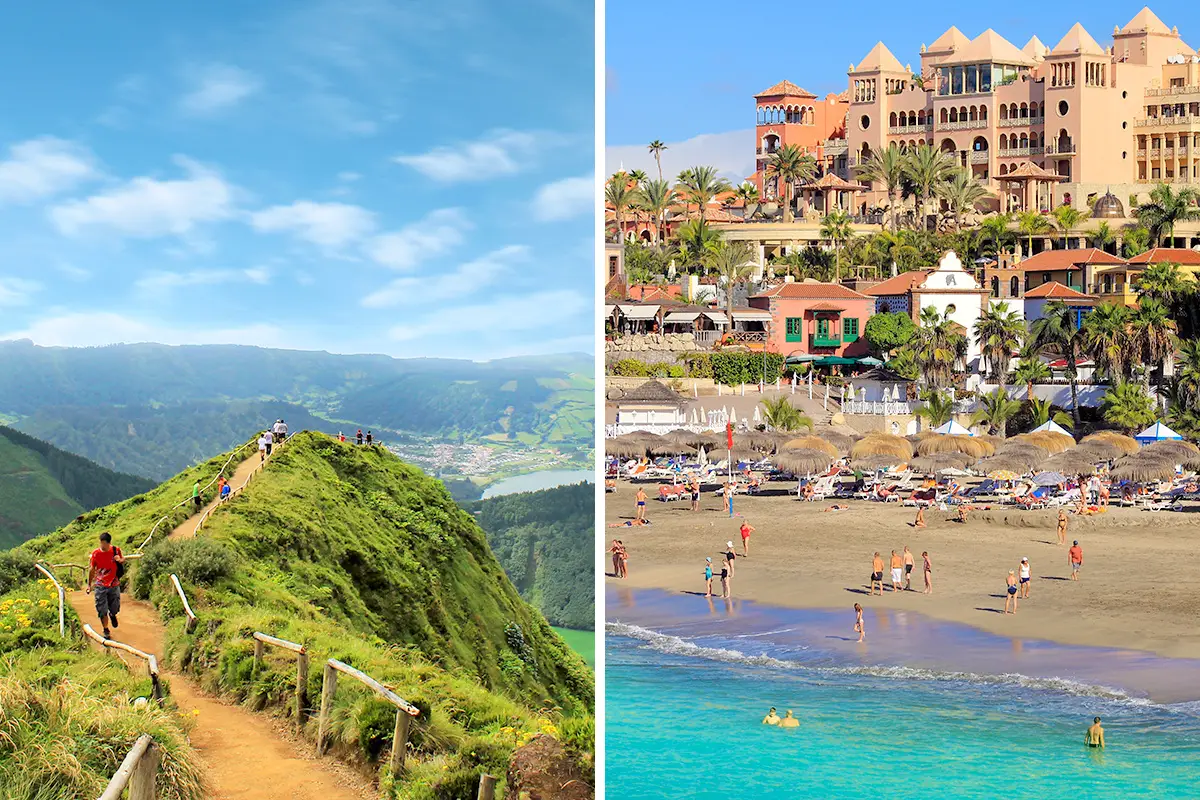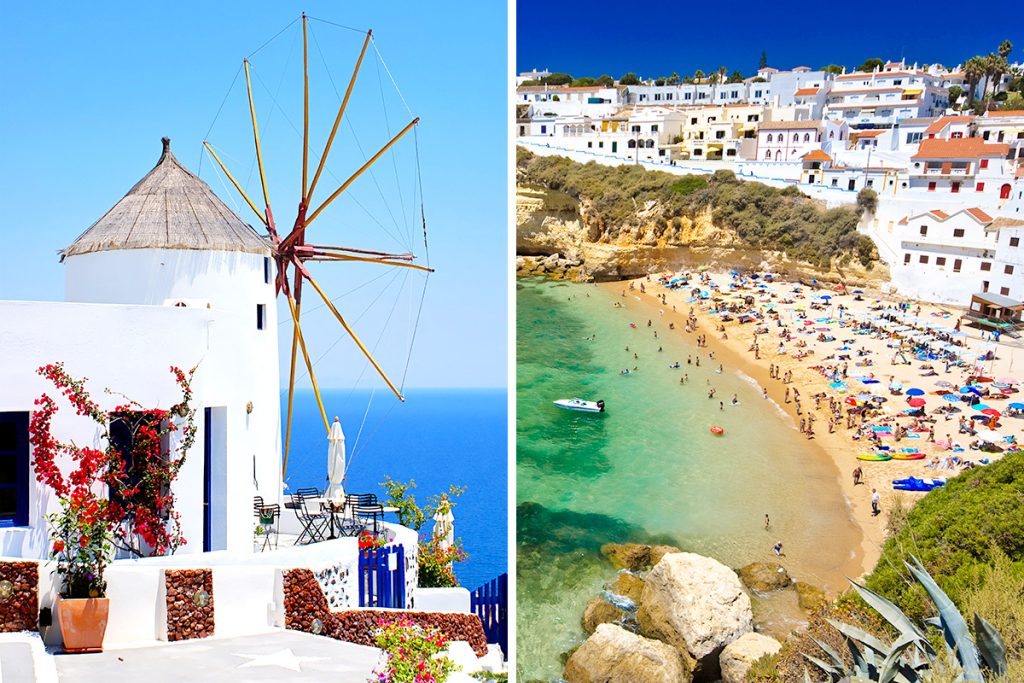Travelers often find themselves torn between the Azores and the Canary Islands, wondering which destination will offer the most unforgettable experience. While each destination has its own charm and allure, understanding the differences between them can help you make an informed decision. So, buckle up and join us on this comparative journey to determine the perfect island getaway for you.
History & Culture
When considering the Azores and the Canary Islands, it’s essential to explore their rich history and vibrant cultures. Both archipelagos boast intriguing pasts and unique customs that will captivate any traveler. Let’s delve deeper into the distinct characteristics of each destination.
The Azores, a Portuguese archipelago, has a fascinating history steeped in maritime exploration. The islands were discovered in the early 15th century and played a vital role in the Age of Discovery. The Azorean culture is a blend of Portuguese and local influences, which is evident in the island’s architecture, language, and traditions.
On the other hand, the Canary Islands, a Spanish territory, has a complex past that dates back to ancient times.
With a history involving the indigenous Guanche people, European colonization, and the sugar trade, the Canarian culture has evolved into a rich tapestry of diverse influences. The islands’ language and customs are an intriguing mix of Spanish, African, and indigenous elements.
While both archipelagos have deep historical roots and captivating cultures, they differ in their primary influences and traditions. The Azores, with its strong Portuguese ties, offers a distinct experience compared to the Canary Islands’ Spanish flavor and unique indigenous heritage.
In conclusion, your choice between the Azores and the Canary Islands will depend on which cultural experience resonates with you. Each destination offers a unique blend of history and traditions that are sure to leave a lasting impression on any traveler.
So, will it be the Portuguese charm of the Azores or the diverse allure of the Canary Islands? The decision is yours.
Attractions & Activities
The Azores and the Canary Islands offer a plethora of attractions and activities that cater to a wide range of interests. Nature lovers, history buffs, and adventure seekers will all find something to pique their curiosity. Let’s explore the unique offerings of these island paradises.
In the Azores, the lush, volcanic landscapes beckon for exploration. Hikers will revel in the numerous trails that wind through the stunning, verdant terrain. For example, the Sete Cidades trail on São Miguel Island provides breathtaking views of the iconic twin lakes.
Whale and dolphin-watching tours are popular activities in the Azores, where several cetacean species can be spotted. Visitors can also indulge in relaxing thermal baths, such as those found in Furnas and Ferraria, to soothe their tired muscles after a day of adventure.
Contrastingly, the Canary Islands boast awe-inspiring volcanic landscapes, including Mount Teide on Tenerife, the highest peak in Spain. Adventure enthusiasts can embark on a cable car ride or hike up to the summit for unparalleled vistas.
For those interested in the natural world, a visit to La Palma’s Caldera de Taburiente National Park or Lanzarote’s Timanfaya National Park offers otherworldly landscapes and unique geological formations. Furthermore, stargazing is a popular activity in the Canary Islands, with La Palma and Tenerife both offering prime locations for admiring the night sky.
If history is your passion, the Canary Islands present a wealth of opportunities to delve into the past. Historical sites such as La Gomera’s Garajonay National Park and Gran Canaria’s Cueva Pintada Museum showcase the islands’ indigenous heritage.
Ultimately, both the Azores and the Canary Islands are replete with captivating attractions and activities. The Azores is an ideal destination for nature enthusiasts and those seeking a more tranquil experience. Meanwhile, the Canary Islands offer a mix of natural wonders, historical intrigue, and opportunities for adventure.
So, when choosing between these two island paradises, consider the experiences that resonate most with you. Whichever destination you select, rest assured that an unforgettable journey awaits.
Beaches
Both the Azores and the Canary Islands boast a variety of picturesque beaches, each with their unique charm and appeal. Whether you’re seeking solitude, adventure, or relaxation, these island paradises have a beach to suit your desires. Let’s take a closer look at the coastal offerings of these destinations.
The Azores, with its volcanic origins, showcases an array of distinctive beaches. The islands are home to both sandy shores and rocky coastlines, offering a unique experience for beachgoers. Santa Bárbara Beach on São Miguel Island is a favorite among surfers, with waves that reach up to 6.5 feet (2 meters) high.
Another notable beach in the Azores is Praia do Almoxarife on Faial Island. This serene, black-sand beach stretches for 0.6 miles (1 kilometer) and provides a tranquil spot for sunbathing, swimming, or simply enjoying the ocean views. The natural beauty of these beaches is complemented by the verdant surroundings, creating a peaceful haven for visitors.
In contrast, the Canary Islands feature an abundance of golden, sandy beaches that invite sun worshipers and water sports enthusiasts alike. Playa de las Teresitas in Tenerife, for instance, is a picturesque beach with a 0.9-mile (1.5-kilometer) stretch of golden sand imported from the Sahara.
Another popular beach in the Canary Islands is Maspalomas, located on Gran Canaria. Renowned for its vast sand dunes and extensive shoreline, Maspalomas provides ample space for beach activities and boasts a lighthouse that has stood sentinel for over a century.
In conclusion, both the Azores and the Canary Islands offer an enticing selection of beaches for travelers to explore. The Azores present a more rugged, unique beach experience, while the Canary Islands provide classic golden sands and ample opportunities for water sports.
Consider your personal preferences when deciding which destination’s coastal offerings align best with your ideal beach vacation.
Eating, Drinking & Nightlife
The culinary and nightlife scenes of the Azores and the Canary Islands offer unique flavors and experiences that cater to various tastes. From local delicacies to vibrant nightspots, both destinations promise memorable dining and entertainment options. Let’s dive into what each location has to offer.
In the Azores, you’ll find a delightful mix of traditional Portuguese cuisine infused with local ingredients. The islands are known for their seafood, with dishes like grilled octopus and fresh tuna steak capturing the essence of the Atlantic Ocean. Rustic, family-run restaurants provide a cozy atmosphere for savoring these flavorful creations.
The Canary Islands, on the other hand, showcase a blend of Spanish, African, and Latin American influences in their cuisine. Here, you’ll encounter dishes like “papas arrugadas” (wrinkled potatoes) served with “mojo” sauce, and “ropa vieja” (a meat and vegetable stew). The culinary scene is diverse, with both upscale restaurants and casual tapas bars to choose from.
When it comes to drinking, the Azores present a more laid-back atmosphere, focusing on local wines and spirits. The islands produce their own wines, such as the crisp, white Verdelho, which pairs well with the abundant seafood. You’ll also find traditional Portuguese spirits like “aguardente” and “licor de amora” (blackberry liqueur).
The Canary Islands, meanwhile, offer a lively drinking scene with a variety of bars, pubs, and lounges. Local wines, such as Malvasia and Listán, are widely enjoyed alongside refreshing beers like Dorada and Tropical. The islands also have a vibrant cocktail culture, with establishments creating innovative concoctions featuring local ingredients.
As for nightlife, the Azores are known for their relaxed, low-key vibe. Live music, particularly traditional Portuguese “fado,” is a staple at local bars and restaurants. Nightlife in the Canary Islands, however, is more energetic, with bustling clubs and late-night venues catering to those looking for lively entertainment.
Ultimately, the Azores are an excellent choice for travelers seeking a more tranquil, authentic dining and nightlife experience. For those craving a more bustling, diverse scene, the Canary Islands may be the better option.
Shopping
Shopping in the Azores and the Canary Islands offers a unique opportunity to discover local crafts, products, and souvenirs. From charming boutiques to bustling markets, both destinations present an array of options for satisfying your retail cravings. Let’s explore what each location has in store.
In the Azores, shopping is centered around local artisans and their crafts. You’ll find handmade ceramics, embroidery, and woven baskets adorning the shelves of quaint shops. These traditional items not only serve as unique souvenirs but also as a testament to the islands’ rich heritage.
The Canary Islands, on the other hand, boast a more diverse shopping scene, catering to a broader range of tastes. Alongside local handicrafts, such as pottery and intricate lacework, you’ll also encounter fashion boutiques and international brands in the islands’ numerous shopping centers.
One aspect that sets Azorean shopping apart is the abundance of local food products. Gourmet cheeses, Azorean tea, and pineapples are popular items to take home as gifts or to enjoy yourself. In contrast, the Canary Islands offer a wider variety of goods, from electronics and cosmetics to imported luxury items, thanks to their duty-free status.
When comparing the two destinations, the Azores cater to those seeking authentic, locally produced items in a relaxed atmosphere. If you’re looking for a more extensive selection and a mix of local and international options, the Canary Islands are the better choice.
Each destination has its own charm, so choose the one that aligns with your shopping preferences and enjoy the treasures you’ll uncover.
Accommodation
The Azores and the Canary Islands both offer a variety of accommodation options, catering to different preferences and budgets. From luxurious resorts to cozy guesthouses, you’re sure to find a comfortable place to rest after a day of exploring. Let’s take a closer look at what each destination has to offer.
In the Azores, you’ll find a wide range of locally owned properties, such as charming bed and breakfasts, boutique hotels, and rustic farmhouses. These accommodations provide an intimate atmosphere and a chance to experience the local culture up close.
The Canary Islands, on the other hand, boast an extensive array of hotels and resorts, from budget-friendly options to five-star luxury establishments. You can also find numerous vacation rentals, such as apartments and villas, giving you the flexibility to customize your stay.
While the Azores focus on providing a more authentic, local experience through smaller-scale accommodations, the Canary Islands cater to a broader audience, with choices to suit every traveler’s taste and budget.
Ultimately, the choice between the Azores and the Canary Islands for accommodation depends on your personal preferences and desired level of comfort. Both destinations have their unique charm, so you can’t go wrong with either option.
Family-Friendliness & Children’s Activities
Both the Azores and the Canary Islands are ideal destinations for families seeking adventure and quality time together. Offering an array of engaging activities for children, each destination provides a unique experience for families to bond and make lasting memories. Let’s delve into what makes each destination family-friendly and the types of children’s activities available.
In the Azores, families can immerse themselves in nature, with countless opportunities for outdoor adventures. Young explorers will love hiking through lush forests, discovering hidden waterfalls, and spotting wildlife. Whale-watching tours and guided walks through volcanic landscapes are sure to keep children entertained and educated.
The Canary Islands also offer a plethora of family-friendly activities, with a focus on water-based fun. Kids will be thrilled to visit water parks, take surf lessons, or go on boat trips to spot dolphins and whales. Land-based activities, such as visiting botanical gardens and exploring volcanic landscapes, are also available for families who prefer to stay on dry ground.
Both the Azores and the Canary Islands prioritize family-friendliness, with a wide range of accommodations catering to families, from spacious vacation rentals to resorts with dedicated kids’ clubs and child-friendly amenities.
In conclusion, the choice between the Azores and the Canary Islands for family-friendliness and children’s activities depends on your family’s interests and preferences.
If your family enjoys outdoor adventures and nature-based activities, the Azores may be the better choice. On the other hand, if water-based fun and amusement parks are more appealing to your family, the Canary Islands might be a better fit. Regardless of your choice, both destinations promise a memorable family vacation.
Getting There & Getting Around
When planning a trip to either the Azores or the Canary Islands, it’s essential to consider how to get there and how to get around once you’ve arrived. Both destinations offer diverse transportation options, making it easy to explore their unique landscapes and attractions. Let’s compare the logistics of traveling to and around these two stunning archipelagos.
To reach the Azores, most travelers will fly into João Paulo II Airport in Ponta Delgada on São Miguel Island, which is about 2,200 miles (3,540 km) from mainland Portugal. Major European airlines and some low-cost carriers offer direct flights to the Azores from select European cities, with the average flight time from Lisbon being around 2.5 hours.
On the other hand, the Canary Islands are served by several airports, with the busiest ones being Tenerife South Airport and Gran Canaria Airport.
Located approximately 1,000 miles (1,610 km) from mainland Spain, the Canary Islands are well connected by various European airlines, with direct flights available from major cities. From Madrid, it takes around 2.5 hours to reach the Canary Islands.
Once in the Azores, getting around the islands can be achieved through a combination of public transportation, car rentals, and inter-island flights or ferries. While public transportation is available, renting a car is recommended for greater flexibility and convenience, especially when exploring the more remote areas.
In the Canary Islands, transportation options are similar, with a robust public transportation system comprising buses, trams, and ferries connecting the various islands. Car rentals are also widely available for those seeking more freedom to explore at their own pace.
In summary, reaching and exploring both the Azores and the Canary Islands is relatively straightforward.
However, depending on your preferred mode of transportation and the level of flexibility you desire, you may find one destination more appealing than the other. Ultimately, both island chains offer stunning landscapes and unforgettable experiences, making either destination well worth the journey.
Weather
When choosing between the Azores and the Canary Islands for your next vacation, considering the weather is essential to ensure a comfortable and enjoyable experience. Both destinations boast mild climates year-round, but there are some differences worth noting.
In the Azores, the weather is generally characterized by a humid, subtropical climate. Expect mild temperatures throughout the year, with averages ranging from 55°F (13°C) in the winter months to 75°F (24°C) during the summer. The Azores are also known for their unpredictable weather, so it’s not uncommon to experience sunshine, rain, and clouds all on the same day.
On the other hand, the Canary Islands enjoy a subtropical climate with warm temperatures and plenty of sunshine. Average temperatures in the Canaries range from 64°F (18°C) in the winter to 77°F (25°C) in the summer, making it an ideal destination for sun-seekers. While the islands do experience occasional rain, the weather is generally more stable than in the Azores.
Ultimately, the choice between the Azores and the Canary Islands may come down to personal preferences.
For those who appreciate a more temperate and unpredictable climate, the Azores could be an appealing choice, while sun-lovers might prefer the warm and stable weather of the Canary Islands.
Safety
When planning a vacation, the safety of your chosen destination is a crucial aspect to consider. In this regard, both the Azores and the Canary Islands generally have a reputation for being safe and welcoming destinations for travelers.
In the Azores, crime rates are relatively low, and visitors usually feel secure while exploring the islands. However, it is always important to take commonsense precautions, such as not leaving valuables unattended and being aware of your surroundings.
The Canary Islands also boast a low crime rate, making them a popular choice among families and solo travelers alike. As with any tourist destination, it’s essential to stay vigilant and practice standard safety measures to ensure a worry-free vacation.
In both destinations, natural hazards are worth considering, as both the Azores and the Canary Islands are volcanic archipelagos. While the risk of volcanic activity is low, it’s still advisable to stay informed about local conditions and follow any safety guidelines provided by authorities.
In conclusion, both the Azores and the Canary Islands are considered safe destinations for travelers.
However, it’s always wise to stay informed about local conditions and follow standard safety practices to ensure a memorable and enjoyable trip.
Cost
When planning a trip, comparing the cost of your options can be a significant factor in your final decision. In this section, we’ll examine the expenses associated with traveling to the Azores and the Canary Islands.
Visiting the Azores can be moderately priced, with accommodations ranging from affordable guesthouses to more luxurious hotels. On average, you might spend around €100 (about $110) per night for a mid-range hotel. Dining out at a local restaurant can cost around €20 (approximately $22) per person for a meal.
The Canary Islands, on the other hand, offer a wider range of accommodation options, from budget-friendly hostels to upscale resorts. Mid-range hotels can be found for around €80 (roughly $88) per night, while meals at local restaurants may cost about €15 (around $16) per person.
In both destinations, the cost of activities, transportation, and other daily expenses can vary depending on your preferences and itinerary. It’s essential to research and plan your budget accordingly to make the most of your vacation.
In summary, the Canary Islands tend to be a more affordable option compared to the Azores.
However, both destinations offer various accommodation and dining options to cater to different budgets, ensuring an unforgettable experience regardless of your financial constraints.
Which Is Better – Azores or Canary Islands?
The choice between the Azores and the Canary Islands ultimately depends on your preferences and priorities. Let’s recap what we’ve learned about each destination to help you make your decision.
In terms of history and culture, the Azores offer a more authentic and less commercialized experience, while the Canary Islands provide a vibrant mix of influences and cultures. Consider your interests in history and local traditions when deciding on your destination.
Regarding attractions and activities, the Azores boast incredible natural beauty and outdoor adventures, while the Canary Islands provide a more extensive range of options, including water sports, theme parks, and cultural experiences. Think about the type of activities that most appeal to you when choosing between these destinations.
Beaches in the Azores tend to be more rugged and secluded, whereas the Canary Islands offer a wide variety of sandy shores with better facilities and warmer waters. Consider your beach preferences and the importance of beach time in your vacation plans.
Eating, drinking, and nightlife options in the Azores are more focused on traditional and local flavors, while the Canary Islands provide an extensive array of international and fusion cuisine, along with a more vibrant nightlife scene. Reflect on your dining preferences and how much nightlife you’d like to experience.
Shopping in the Azores is more limited and focused on local crafts and products, whereas the Canary Islands offer a broader range of shopping options, including designer brands and larger shopping centers. Think about the importance of shopping during your vacation.
Accommodation options in both destinations cater to different budgets and preferences, with the Canary Islands having a wider variety of options. Reflect on your accommodation needs and requirements when choosing between these destinations.
In terms of family-friendliness and children’s activities, the Canary Islands offer a greater range of options and facilities, making it a more appealing choice for families with kids.
Getting to and around the Azores can be more challenging due to limited transportation options, while the Canary Islands are more accessible and better connected. Consider the ease of travel when making your decision.
Weather-wise, the Canary Islands boast more consistently warm temperatures, while the Azores experience more seasonal variations and cooler weather. Think about your preferred climate and the time of year you plan to travel.
Safety and cost considerations are essential for any trip. Both the Azores and the Canary Islands offer relatively safe travel experiences, with the Canary Islands typically being a more affordable option.
In conclusion, the Azores are ideal for those seeking a more authentic, nature-focused experience with a relaxed atmosphere, while the Canary Islands cater to a broader range of interests and offer more variety in terms of activities, beaches, and entertainment. Consider your personal preferences and priorities when deciding which destination is the perfect fit for your next vacation.







